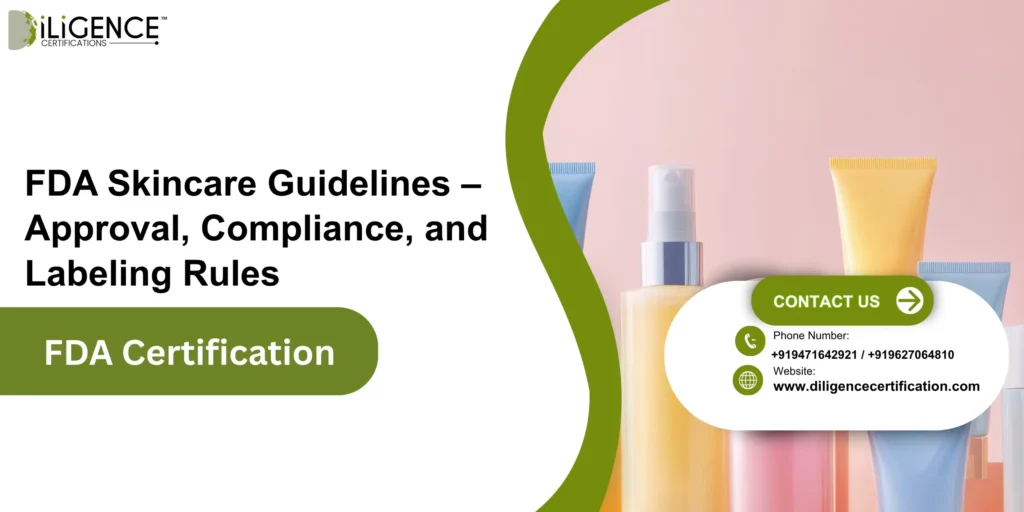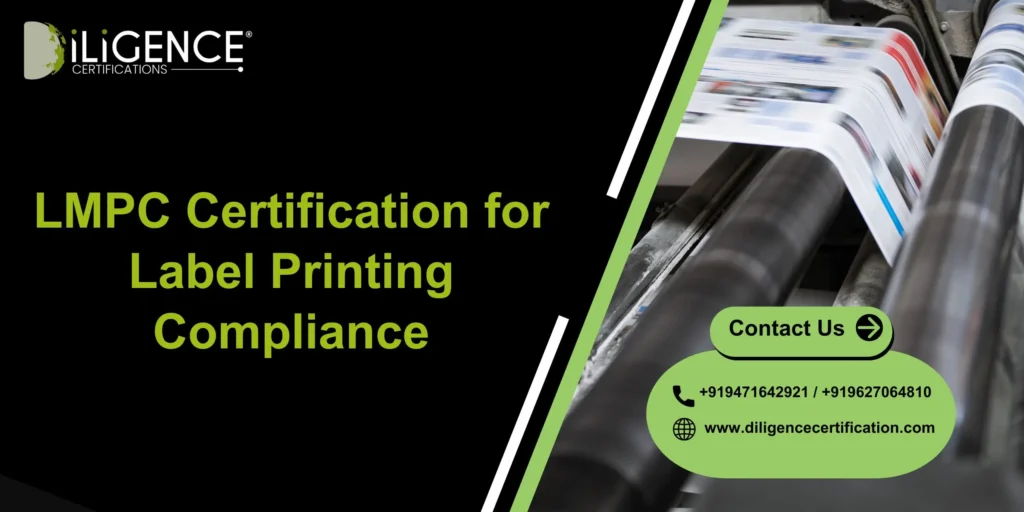- FDA For skincare products but regulates them under cosmetics law to ensure safety, labeling, and ingredient compliance.
- The Modernization of Cosmetics Regulation Act (MoCRA 2022) now requires facility registration, product listing, and safety documentation.
- Indian skincare exporters must align with both CDSCO and FDA regulations for smooth U.S. market entry.
- FDA for Skincare: Complete Guide to FDA Regulations, Approval & Certification for Skincare Products
Introduction
In rapid evolution, the global skincare industry responds to the demands of consumers for safe, effective, and transparent products. This key moment in history calls for few other deities on earth being so crucial to maintaining the integrity of a product and, by extension, food for an ingested consumer trust. Regarded as one of the leaders in regulating authorities in the world, the U.S. Food and Drug Administration (FDA) sets standards for safety, labeling, and manufacturing practices for skincare and cosmetic products.
For any skincare brand entering the U.S. market or aligning with the best practices globally, understanding the regulations of the FDA is a must. The FDA is charged with ensuring products are safe for human use, properly labeled, or not bearing misleading claims. Following the enactment of the Modernization of Cosmetics Regulation Act (MoCRA), these processes of compliance became highly structured and, on an enforceable basis, requiring topics such as product listing, facility registration, and substantiation of safety to be addressed.
This guide will cover all the elements related to FDA regulations for skincare products, from classification and labeling standards to compliance requirements and registration procedures. It will also detail ways by which Indian and international brands can seek FDA compliance with the expert assistance of Diligence Certifications.
Understanding FDA’s Role in Skincare Regulation
FDA Responsibility
The Food and Drug Administration (FDA) enforces the Federal Food, Drug, and Cosmetic Act (FD&C Act) in the area of skincare products.
Its job is not to give approval to every cosmetic product prior to being placed on the shelf but instead to make sure that cosmetic products are safe for use by consumers and are properly labeled without any misleading claims regarding their colorful advertised uses, are not composed of harmful ingredients, etc.
The FDA looks into cosmetic products:
- Product safety and toxicity
- Label accuracy (ingredient lists, claims, net quantity)
- Manufacturing standards (CGMPs)
- Prohibition of adulterated or misbranded products
The Big Misconception: FDA-Approved Skincare
There’s a major difference between FDA-regulated and FDA-approved:
- FDA-Regulated: According to this, all skin care and beauty products are responsible for adherence to FDA regulations in the matters of safety, labeling, and manufacturing requirements.
- FDA-Approved: Generally refers to drugs/medical products that treat and cure any conditions (such as acne medicine or anti-fungal creams).
So, basically, your moisturizer or serum isn’t on the approval list unless they advertise themselves to “heal eczema” or “permanently remove scars.” Agents that do such claims are considered drugs by law.
What is FDA For Skincare Products?
The FDA (Food and Drug Administration) is a U.S. government agency responsible for protecting public health by ensuring the safety, quality, and labeling accuracy of foods, drugs, medical devices, and cosmetics — including skincare products.
When it comes to skincare, the FDA’s role focuses on regulation rather than pre-approval. Unlike drugs or medical devices, most skincare products are not required to be pre-approved by the FDA before being sold. However, the FDA ensures that:
- Products are safe for use under labeled or customary conditions.
- Ingredients are permitted and used within allowed limits.
- Labels are truthful, accurate, and not misleading.
- Products follow Good Manufacturing Practices (GMP) to maintain quality and hygiene standards.
Classification of Skincare Products under FDA
Skincare products fall into two main categories under FDA regulations:
- Cosmetics:
- Intended for cleansing, beautifying, promoting attractiveness, or altering appearance.
- Examples: moisturizers, cleansers, face creams, toners, and lotions.
- No FDA pre-approval required, but must be safe and properly labeled.
- Drugs (or Cosmetic-Drug Combination):
- Intended to treat or affect the structure/function of the skin (e.g., acne, wrinkles, pigmentation).
- Examples: anti-acne creams, sunscreen, anti-aging serums with active ingredients.
- FDA approval is mandatory before marketing.
Key Responsibilities of FDA in Skincare
- Regulating ingredients: Ensures prohibited or restricted substances are not used.
- Labeling supervision: Confirms all ingredients and claims are properly listed.
- Monitoring marketing claims: Prevents misleading claims like “clinically proven” or “miracle cure.”
- Ensuring GMP compliance: Maintains hygiene, testing, and consistency during production.
- Taking enforcement actions: Issues warnings, recalls, or bans unsafe or misbranded products.
Cosmetic vs. Drug
Cosmetic Skincare
A product is considered cosmetic if it is intended to cleanse, beautify, or alter appearance — for example:
- Moisturisers
- Cleansers
- Toners
- Sunscreens without therapeutic claims
These do not require FDA approval but must comply with labeling and safety rules.
Drug Skincare
If a skincare product claims to treat, prevent, or cure a condition, it becomes a drug. Examples include:
- Acne treatments (“cures acne”)
- Anti-aging serums (“reverses wrinkles”)
- Whitening creams (“removes pigmentation permanently”)
Such products require premarket approval, clinical data, and NDA (New Drug Application) or ANDA (Abbreviated NDA) filings with FDA.
Why Classification Matters?
Many brands fall into regulatory trouble because their marketing crosses into the “drug” category unknowingly.
For instance, calling a cream “clinically proven to treat eczema” could trigger FDA scrutiny, even if it’s sold as a cosmetic.
The Modernization of Cosmetics Regulation Act (MoCRA 2022)
Why MoCRA Matters?
Before 2022, the U.S. cosmetic industry operated under rules that hadn’t changed in over 80 years.
With the passing of MoCRA (Modernization of Cosmetics Regulation Act), the FDA gained stronger authority to regulate skincare products more effectively.
What MoCRA Requires?
MoCRA introduced new, mandatory requirements:
- Facility Registration: Every cosmetic manufacturing facility (domestic or foreign) must register with the FDA.
- Product Listing: Every skincare product must be listed in the FDA’s new Cosmetics Direct portal.
- Responsible Person: Each company must appoint a “responsible person” to handle FDA communication and safety records.
- Safety Substantiation: Brands must have documentation proving that their product is safe for intended use.
- Adverse Event Reporting: Any serious consumer reaction must be reported to FDA within 15 business days.
Enforcement and Deadlines
As of 2025, MoCRA enforcement is in full effect.
Brands that fail to register their facilities or list products risk:
- Import detention or seizure
- Mandatory recalls
- Civil penalties
- Loss of distribution rights in the U.S.
The FDA has already delayed enforcement once to allow brands to adapt — but that grace period is over.
Ingredient Safety and Prohibited Substances
Ingredients That Are Prohibited
FDA strictly prohibits skincare products containing ingredients that could harm consumers.
Examples include:
- Chloroform
- Mercury compounds
- Chlorofluorocarbons (CFCs)
- Unsafe levels of formaldehyde
Even if an ingredient is legal in India, it may not be allowed in the U.S. market.
Restricted Ingredients
Some ingredients are not banned but restricted in quantity or purpose, such as:
- Hydroquinone (allowed only under medical supervision)
- Salicylic acid (limited concentration)
- Sunscreen actives (regulated under OTC monograph)
Color Additives: The Only Pre-Approved Category
Color additives are the only cosmetic ingredients that require FDA approval before use.
Brands must use colors from the FDA’s certified list and mention batch numbers for traceability.
Product Safety Testing
While FDA doesn’t prescribe a fixed testing protocol, brands must prove safety through:
- Microbial testing
- Patch tests and dermatological evaluation
- Toxicological review
- Stability and shelf-life studies
- Non-maintenance of specified records may lead to enforcement action.
FDA Skincare Products: Categories and Compliance Requirements
The FDA regulates all sorts of skincare products to make sure anything sold in the U.S. satisfies safety, labeling, and manufacturing standards. If brands know what products fall under FDA regulation, they can stay compliant and away from legal bindings.
1. Moisturizers and Lotions
- They are intended to moisturize and maintain the texture of the skin.
- Key compliance points: Ensure that ingredients are safe, ensure that labels list all INCI names, and claims such as “deep hydration” must be true and substantiated
2. Cleansers and Face Washes
- Cleansing products wash away dirt, oil, and makeup without inflicting any damage.
- Key compliance points: Avoid harsh chemicals or banned ingredients. Labels must include instructions for use and precautions for sensitive skin.
3. Sunscreens (Cosmetic and OTC Combination)
- Depending on their SPF and claims, some sunscreens are considered a cosmetic, whereas some others are deemed drugs at the OTC level.
- Key compliance points: SPF labeling, UV protection claims, and concentration of ingredients must conform to FDA standards.
4. Serums and Anti-Aging Treatments
- Serums treat specific skin concerns such as fine lines, dullness, or pigmentation.
- Key compliance points: Any claim that implies treating conditions such as wrinkles may classify the product as a drug and require testing and documentation.
5. Masks and Exfoliators
- Masks, scrubs, and peels change skin texture and appearance.
- Key compliance points: Ensure abrasives and actives are safe; do not allow prohibited substances, such as aggressive levels of hydroquinone.
6. Toners and Astringents
- Toners balance pH and refresh the skin after cleansing.
- Key compliance points: Avoid misbranding claims such as “clinically proven to prevent acne” unless the evidence supports such claim.
7. Lip Care Products
- Lip balms, scrubs, and treatments are considered cosmetics.
- Key compliance points: Ingredients must be safe for ingestion (even in small quantities), with allergens clearly listed.
8. Eye Creams and Sensitive Skin Formulations
- These products treat delicate skin.
- Key compliance points: Must be dermatologically tested for safety, do not use irritants, and warnings must be clearly stated.
9. Specialty Products
- Anti-dark spot creams
- Skin lightening or brightening products
- Body butters and oils
- Hand sanitizers with skincare benefits
Key compliance reminder: Any skincare product claiming to “treat” a medical condition may be regulated as a drug under FDA law, requiring additional approvals
Labeling and Packaging Regulations
What FDA Requires on Labels?
Every skincare product label must include:
- Product name and identity
- Net weight or volume
- List of ingredients (in INCI names)
- Manufacturer/distributor details
- Warning statements (if applicable)
Misbranding and False Claims
Misleading labels, exaggerated claims, or missing mandatory information can make a product “misbranded.”
For example:
- “FDA Certified” when no registration exists
- “Chemical-free” (a scientifically invalid claim)
- Missing net quantity or allergen information
Once misbranded, the FDA can issue warning letters or remove the product from sale.
Country of Origin and Import Labels
Foreign exporters must also declare:
- Country of origin (“Made in India”)
- Importer details
- Any translation if required for local labeling in the U.S.
Step-by-Step FDA Compliance Process for Skincare Brands
Here’s a simplified roadmap for Indian skincare brands planning to export to the U.S.:
| Step | Requirement | What It Involves |
| 1 | Determine Classification | Decide if your product is cosmetic or drug-based |
| 2 | Ingredient Review | Check every ingredient against FDA prohibited/restricted lists |
| 3 | Testing & Safety | Conduct safety, microbial, and stability testing |
| 4 | Appoint U.S. Agent | Required for foreign entities to communicate with FDA |
| 5 | Register Facility (Form 5066) | Every manufacturing site must be listed with FDA |
| 6 | List Products (Form 5067) | Submit product listing data (brand, ingredients, packaging) |
| 7 | Label Review | Align label text, INCI names, and warnings with FDA format |
| 8 | Submit Adverse Events | Report consumer complaints or injuries within 15 days |
| 9 | Maintain Records | Keep test data, batch records, and label proofs for audits |
| 10 | Renew/Update Annually | Update listings or facility details every year |
Brands that complete this checklist can confidently label themselves FDA Compliant — not FDA Approved.
Common Mistakes Brands Make
- Using “FDA Certified” Marketing Claims
- FDA doesn’t issue certificates for cosmetics. This claim can be legally risky.
- FDA doesn’t issue certificates for cosmetics. This claim can be legally risky.
- Copying EU Label Formats
- U.S. label layout and INCI placement differ from EU or ASEAN formats.
- U.S. label layout and INCI placement differ from EU or ASEAN formats.
- Ignoring MoCRA Registration
- The new rules make registration mandatory, not optional.
- The new rules make registration mandatory, not optional.
- Not Appointing a U.S. Agent
- Without a U.S.-based contact, FDA can detain your shipment.
- Without a U.S.-based contact, FDA can detain your shipment.
- Unsubstantiated “Dermatologist-Tested” Claims
- You need documented evidence — like a signed dermatological report — to use this phrase legally.
- You need documented evidence — like a signed dermatological report — to use this phrase legally.
FDA Inspections and Penalties
Under MoCRA, FDA inspectors can:
- Audit manufacturing records
- Review test data
- Collect product samples
- Mandate recalls
If violations are found, penalties may include:
- Product seizure or recall
- Import detention or refusal
- Warning letters (publicly posted)
- Civil or criminal action for repeated violations
Maintaining a compliance file with all documentation helps defend against enforcement action.
Cost, Timeline, Validity, and Renewal
| Aspect | Description |
| Cost Factors | Testing, consultant fee, U.S. agent fee, and documentation costs (no fixed FDA charge) |
| Timeline | 4–8 weeks for documentation and registration, depending on complexity |
| Validity | Facility registration and product listing remain valid until updated annually |
| Renewal | Annual update of facility and product details through FDA’s Cosmetics Direct portal |
While the FDA doesn’t charge for cosmetic registration, external costs (consultants, testing, translations, etc.) vary by brand size.
Why Indian Brands Should Care About FDA Compliance?
U.S. is the World’s Largest Cosmetic Market
- Exporting to the U.S. opens huge opportunities, but only compliant brands can sustain distribution.
Builds Global Brand Trust
- Even if you sell mainly in India, being “FDA compliant” builds trust with consumers and partners.
Avoids Costly Legal Issues
- One product recall or customs detention can destroy months of progress and reputation.
Aligns with Indian CDSCO Rules
- The Indian Cosmetic Rules, 2020, align closely with FDA standards. Meeting both makes your brand export-ready.
How Diligence Certifications Helps?
At Diligence Certifications, our experts specialize in FDA compliance for skincare and cosmetic products.
We assist brands through:
- Product classification (cosmetic vs. OTC drug)
- Ingredient and label compliance review
- Facility registration and product listing under MoCRA
- U.S. agent coordination and documentation
- Pre-audit safety verification
Our consultants ensure you meet every FDA regulation while keeping your brand’s aesthetic and claims intact.
We also provide assistance with CDSCO Cosmetic Registration in India, ensuring dual compliance for export-oriented businesses.
Conclusion
FDA for Skincare is not about chasing an approval stamp — it’s about building regulatory integrity that earns consumer trust.
In the post-MoCRA world, compliance isn’t paperwork; it’s protection — against recalls, import holds, and credibility loss.
For Indian skincare brands aspiring to go global, understanding FDA regulations for skincare products and FDA certification compliance is the smartest investment you can make.
Partner with Diligence Certifications to make your skincare products globally compliant, export-ready, and confidently aligned with every U.S. FDA requirement.
Frequently Asked Questions
Do skincare products require FDA approval?
No. Skincare products labeled as cosmetics do not require FDA approval, but they must comply with FDA regulations concerning labeling, safety, and ingredients.
What does FDA certification mean for skincare?
The FDA does not provide any kind of "certificates." Compliance is by way of registration of the facilities and listing of products under MoCRA.
Can I market such skincare products in the U.S. without registration?
No. As per MoCRA 2022, registration and listing are compulsory for all cosmetics sold within the U.S.
What if my skincare product claims to cure acne or eczema?
Then it becomes our drug under the FDA laws requiring pre-market approval and clinical data.
How should I provide for the registration of my skincare products in the FDA?
Submit facility and product information via FDA Cosmetics Direct portal (tracking form numbers 5066 and 5067).
What are the newest FDA updates for 2025?
FDA is increasing inspections under MoCRA and proposing asbestos testing for talc-based products.
Can I mention “FDA Approved” on my cosmetic packaging?
No. Only drugs can claim FDA approval. For cosmetics, you may use “FDA compliant” if all regulations are met.
What documents are needed for compliance?
Safety test reports, product composition, batch records, labeling artwork, and facility information.
How long does FDA registration last?
It remains active as long as you update facility and product data annually.
Who can help with FDA registration in India?
Diligence Certifications provides end-to-end support for FDA and CDSCO skincare compliance.








 BIS Certification
BIS Certification
 CDSCO
CDSCO
 CPCB
CPCB
 LMPC
LMPC
 WPC Approval
WPC Approval
 Global Approvals
Global Approvals
 TEC
TEC
 ARAI
ARAI
 BEE
BEE
 ISO Certification
ISO Certification
 Drone Registration
Drone Registration
 NOC For Steel
NOC For Steel



















 Business Registration
Business Registration














 Legal Services
Legal Services
 Trademark Registration
Trademark Registration
 Copyright Registration
Copyright Registration
 Patent Registration
Patent Registration
















































